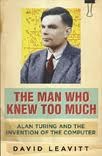‘The alchemist took logical principles, wire, and electronic circuits, and made a machine. The knight defended the right of that machine to a future. If only he had been able to save himself.’ – The Man Who Knew Too Much by David Leavitt
It was brought to my attention through this excellent post by the YABookers that this month is LGBT+ History Month in the UK, (it occurs at different times d epending on what country you’re in) and it go me thinking about prominent LGBT+ historical figures. It was that that I realised that this was the time to talk about, what is for me, one of the most tragic loses from the 20th century, and one that is very close to my heart.
epending on what country you’re in) and it go me thinking about prominent LGBT+ historical figures. It was that that I realised that this was the time to talk about, what is for me, one of the most tragic loses from the 20th century, and one that is very close to my heart.
The story of the Bletchley Park code-breakers is one that is familiar to many of us thanks to recent dramatisations such as ‘The Imitation Game’ and ‘Enigma’, and it is a story that captured my attention like no other when I was a teenager just getting in to history. Alan’s story may also be familiar to you, but it remained hidden for a long time, and Alan never knew the impact he had on modern computing, never mind his impact on post war England. So, for those interested, here is a little bit about Alan and why we should remember him this month.
A Cambridge maths graduate and professor, Turing’s mind was a one-in-a-generation occurrence, resulting in his recruitment to Bletchley Park to play a part in the breaking of the German Enigma code in World War Two. Nicknamed ‘The Unbreakable Code’ Bletchey’s code-breakers worked tirelessly to break a code, the likes of which had never been seen before. But only Turing realised that only a machine would be able to break the work of another machine. The ‘Turing Machine’, a device built by hand from scratch by Turing himself, was the first incarnation of the modern computer, and his work eventually helped to break the Enigma code and win the war over Germany. It was estimated that the work of the code-breakers shortened the war by around two years saving 14 million lives.
So why write about Turing? Well, Turing was a gay man living in the 1940s, a time of mass gay persecution, and a man who underwent chemical castration to avoid going to jail for his sexuality, and to be able to continue his work on his machines. The toll of this however resulted in Turing’s suicide and, just because he was homosexual, one of the greatest minds of the 20th century was lost, which to me, is desperately sad. Especially sad considering his contributions to science, computing, and the war effort. Who knows if we would be more advanced in the field of computing now had Turing lived (although I’m willing to bet that we would be), but I for one am incredibly sad, and angry, that he endured such an experience just because of his sexual preference. We still have a way to go in the acceptance of LGBT+ people, but we should also celebrate how far we have come since the times that Turing lived in.
Turing received a full pardon from the Queen in 2013, but it was too late to bring back Turing’s brilliant mind, and this quote from David Leavitt’s book ‘The Man Who Knew Too Much’ is one that has always stuck with me. Leavitt writes that often people are hounded because of their discoveries…’Turing was hounded in spite of it.’
If you want to read more on this subject, I’ll leave some book recs below, but if this particular area of study doesn’t float your boat, then check out these recommendations by the YABookers.
Until Next Time x
Book Recommendations on Alan Turing and the breaking of the Enigma code:
- The Man Who Knew Too Much by David Leavitt
- The Secret Listeners by Sinclair McKay
- Alan Turing: The Enigma by Andrew Hodges
- The Bletchley Girls by Tessa Dunlop
- Seizing the Enigma by David Kahn
- Enigma by Hugh Sebag-Montefiore
- The Secret Life of Bletchley Park by Sinclair McKay
